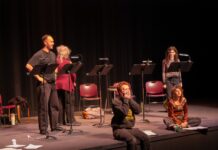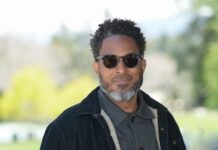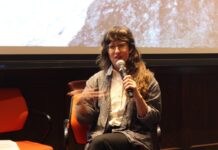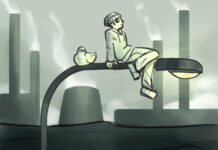Outside Thorne Hall, Occidental students and LA community members formed a line that nearly extended to the Tiger Cooler an hour before the highly-anticipated arrival of DarkMatter. The transgender South Asian performance art duo comprised of Alok Vaid-Menon and Janani Balasubramanian (both of whom prefer the pronoun “they”) performed at Occidental April 18 as part of their It Gets Bitter Tour.
When the duo finally hit the stage, Vaid-Menon was clad in white platform sneakers and a pastel floral jumper, while Balasubramanian wore black and white checkered skinny jeans and a shirt with geometric designs. Each sported a bindi on their forehead.
Their performance consisted of spoken word poetry that satirized and criticized the worldwide It Gets Better Project created in 2010 to support queer and transgender youth. The project sparked over 50,000 Youtube users—including celebrities such as Ellen DeGeneres and Adam Levine and corporations such as Google—to recount their struggles and offer support.
In the poem “Dear Dan Savage,” DarkMatter vocalized their discontent with the creator of It Gets Better. DarkMatter said that, as queer youth, they were told that their struggles would “get better,” but as they grew up they realized that the queer and transgender rights movement often excludes people of color. The intent of their performance was to bring this inequality to light with personal experiences.
DarkMatter opened with an emotionally intense poem about the clash between their sexual and religious identities. To lighten the mood, Balasubramanian followed with a joke about President Obama.
“How do you send Obama a love letter?” they asked the crowd. “Leave it in your drafts folder.”
The rest of the performance yo-yoed between painful stories followed by equally profound but lighthearted poems. They spoke about post-9/11 experiences, “poop therapy” as a form of colonialism, emotionally haunted mothers and grandmothers, racism experienced by the Patil twins in Harry Potter and nursery rhymes that Balasubramanian said were modified for “babies who want to fight imperialism.”
On stage, Vaid-Menon and Balasubramanian shouted, laughed, danced and at times were close to tears as they confessed emotions that they said they could not personally communicate to family and friends. The art form allows them both to express their frustration with racial inequality in the queer and transgender movement. It was not until they met at Stanford in 2009 and began writing spoken word together that they found this form of healing. After performing together in college, they went on their first tour in 2013 with the name DarkMatter. Although based in New York, the duo has traveled to stages and universities across the country.
According to Vaid-Menon and Balasubramanian, their name came from the phenomenon that dark matter and dark energy comprise 96 percent of the universe, but are unseen and misunderstood except for their effects. DarkMatter said their work does the same by discussing political phenomena only understood in their effects and challenging the ways people think about space, time and matter in order to dismantle systems of oppression.
DarkMatter said that, because their poems reflect specific phases of their lives, their messages are always shifting. In general, their poetry discusses queer and transgender rights, feminism and racial and economic justice.
“We don’t just need to critique; we need to heal, abolish and build anew,” Vaid-Menon and Balasubramanian said via email.
The politics and ideology of DarkMatter’s work caught the attention of Adrian Adams (sophomore), who came across their spoken word performances on YouTube. As a community organizer for the Office of Community Engagement, he began planning the event in July 2014.
“I brought them because I think this campus needs to move beyond ‘queer-trans 101’ and really needs to get into how queer and trans experiences are connected to larger systems of oppression,” Adams said.
Frances Delfin (sophomore), a programming assistant at Occidental’s Intercultural Community Center, helped organize the event and said that it was evident that DarkMatter’s poetry touched many audience members. Adams, too, felt like the poetry directly spoke to his personal experiences.
DarkMatter said that they change the way they perform depending on the audience and how people receive them, and Occidental’s audience gave DarkMatter a lot of energy to work with—whooping, clapping, laughing and shouting encouragement throughout every show.
DarkMatter said that they often encounter people—usually white, cisgender and/or masculine people—who are offended by their work, but they have never had their shows interrupted.
“We tend to just find out about it after and giggle,” DarkMatter said.
The lighthearted manner and quirky metaphors with which DarkMatter poked fun at cliché white college students with unpaid internships in Bangladesh, chai lattes and sweaty yoga mats, for example, eased the tension in order to create an opportunity for self-reflection instead of anger.
“Their lyrics were pretty explicit and harsh, especially against white people, but they were hilarious and no one around me seemed offended,” an anonymous audience member said.
DarkMatter said that they hoped their performance reminded students the importance of talking about and organizing against racial and gender injustice.
“We really want to validate all of the queer and trans students of color at [Occidental] for all of the important work they are already doing to survive and thrive despite constant delegitimization of their identities and political work,” DarkMatter said. “It can often feel hard to continue doing the work when people easily disregard you.”
Adams plans to keep up the momentum that DarkMatter brought to campus by using art as a way to discuss racial and gender oppression. He said that his next goal is to hold an art festival on campus—but open to the Eagle Rock community—that showcases queer and transgender artists.
Delfin said that events similar to DarkMatter’s performance and the potential art festival would be the kind of projects that the Diversity and Equity Board would put on if it is awarded the necessary funds.
“I love them because it’s very unapologetic,” Delfin said. “For a lot of the healing that we talked about, as people of color, you need to be unapologetic about your experience.”
![]()































